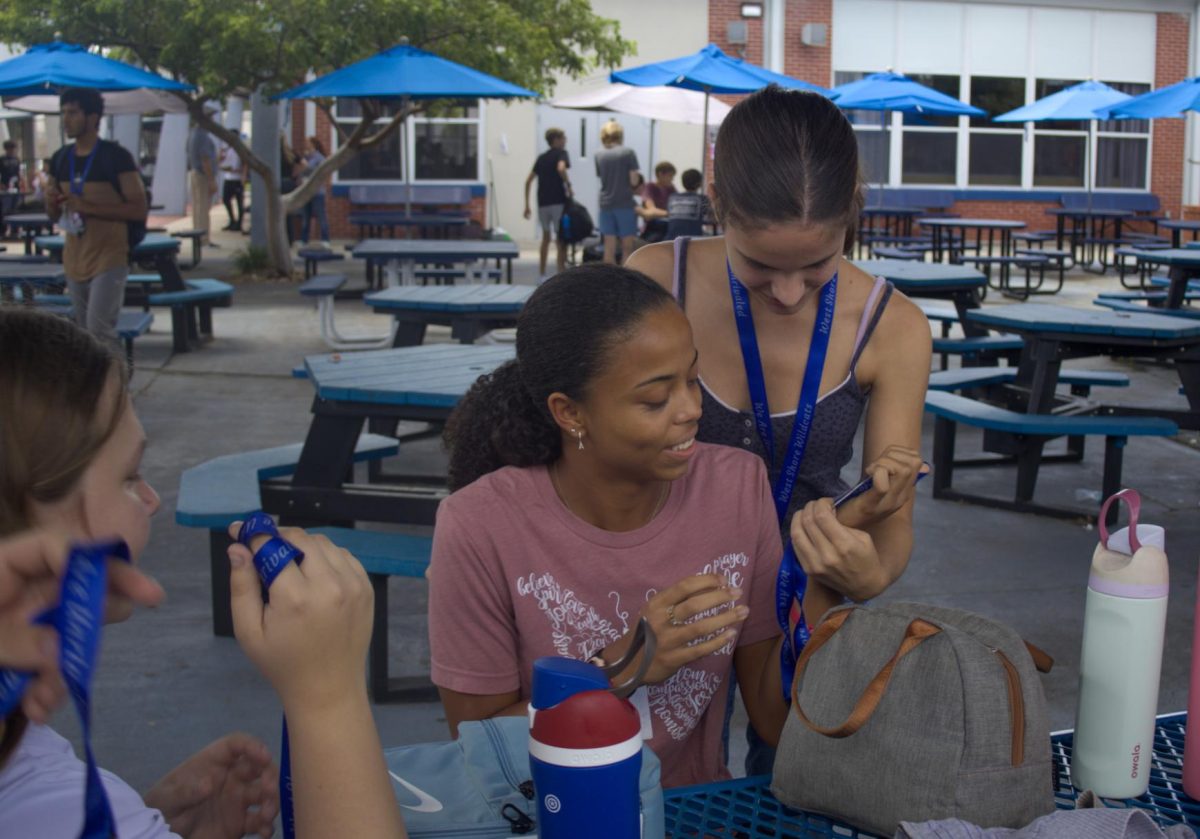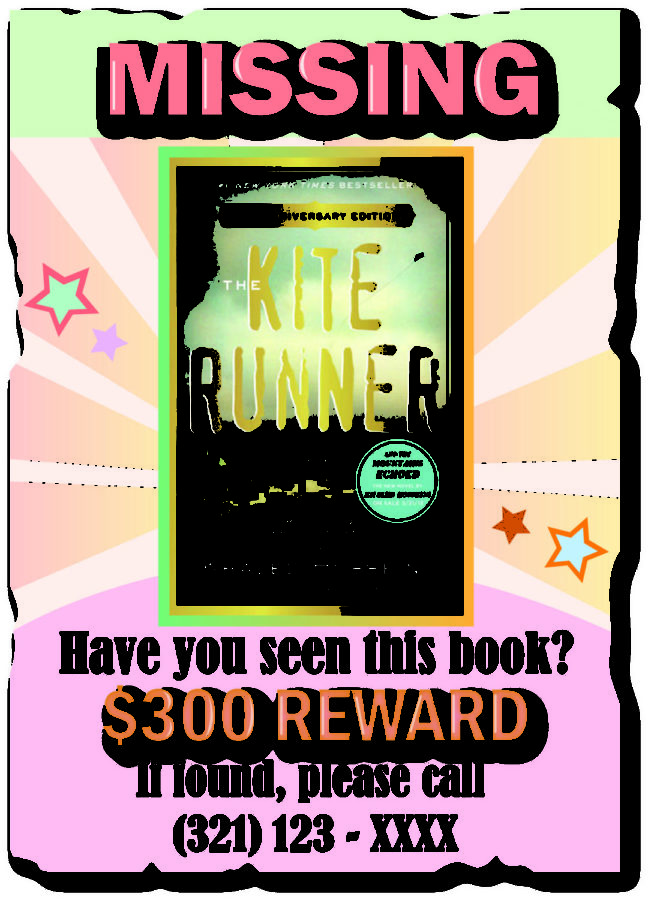Missing Class Set of ‘The Kite Runner’ Raises Questions on Campus
January 24, 2023
When literature teacher Nancy Bramlett casually strode into the English department’s book room to collect her class set of “The Kite Runner,” she had not expected to find a glaring space on the shelf staring back at her. To her surprise, only nine copies were left of the original twenty-five.
“I contacted Ms. [Jeanie] Griffin, who is department chair, to ask if maybe the books had been moved,” Bramlett said. “She said ‘not that she knew of,’ so she and I went back the next day and looked everywhere and could not find them. That’s when we were really shocked and trying to figure out what could have happened.”
“The Kite Runner” has been a frequently challenged book throughout school districts. Earlier this year, the Brevard chapter of Moms for Liberty, a conservative organization that promotes parental rights within education, deemed the book inappropriate for minors due to its depiction of homosexual rape. Over the summer, parents are given access to the book room in order to organize and sort through reading material for volunteer hours.
While Bramlett declines to comment on whether or not she believes the books were intentionally removed, she states that it would be a “travesty” if they were.
“As an AP Literature teacher and a proponent of reading all my life, I think that banning books is never the answer,” she said. “Parents, by all means, can regulate what their children read, but I don’t necessarily think that [they] should regulate what my children read or what other students read.”
Bramlett feels “very lucky” that AP English Literature’s status as a college-level course has allowed her to evade the recent wave of book bans that have caused her fellow English teachers to clear their bookshelves.
“Some of the other teachers are not as fortunate as I am because their hands are tied on what books they can teach,” she said. “It’s really tragic that students in eighth grade cannot read “The Diary of Anne Frank.” I am thrilled that I’m still able to teach the books that resonate not only with me, but with my students as well and that are applicable to the AP Exam. I have been in contact with Steven Price, who is the chief reader for AP Literature. We’ve had many discussions about how [the] College Board definitely disagrees with banning books and limiting what can be taught.”
Bramlett later discovered that half of her 60 copies of “The Great Gatsby” had disappeared as well.
“It’s just very bizarre,” she said. “I usually obsess over mysteries, but I just don’t think we’re going to find out [what happened]. We [teachers] have taken new precautions with books. We are now able to keep them in our classrooms, so that we can keep them under lock and key. Hopefully, they won’t go walking off again.”
Principal Rick Fleming was able to obtain brand new copies of “The Kite Runner” via the school’s parent-teacher association. Keller Williams Realty, a local real estate company that “celebrates teachers as heroes in the community,” provided 38 new copies of “The Great Gatsby.” According to Bramlett, it felt “very nice” to have such a supportive community behind her as a teacher.
“When the pandemic first started, we [teachers] were seen as heroes and everybody appreciated how hard we were working,” she said. “That lasted about a month and we were right back in the trenches. All of the negative publicity that we get now with everything that is going on politically is really ridiculous. Teachers put their hearts and souls into what they do for the betterment of students. The pay is not great and when you’re under fire by public opinion, it can be very demoralizing. There’s a reason there’s a teacher’s shortage in the state. Our administration has been extremely supportive. Mr. Fleming immediately got me new copies of “The Kite Runner,” he didn’t even question it.”
Fleming calls “The Kite Runner” a “fascinating story” and wants to ensure it remains on bookshelves.
“I read everything you guys read,” he said. “The Kite Runner was one of my favorites. I wanted to make sure our kids were still able to read it. It’s important to make certain that [they] understand those classics.”
While Fleming empathizes with the “nobility” of those who challenge books and are “worried about kids,” he says that censoring tough topics ultimately hurts students.
“AP classes are college-level classes,” he said. “You are going to be exposed to things that may be uncomfortable [such as] rape, incest, sexual situations, [and] social situations. Those things exist in society, and if you shield yourself from those everywhere, then you’re not going to be able to recognize signs of when those things may be going on. So, for me, it’s very important to expose our children to that.”
Fleming attributes the books’ disappearance to a mistake on behalf of the parent volunteers, rather than a “willful” effort.
“I think that the volunteers that we had in there were just sorting books and they may have ended up, unfortunately, in a DCR box,” he said. “DCR is where they take books that we no longer use. It is very possible that an honest mistake [could] happen like that. For the most part, our parents are very supportive and they understand that The Kite Runner is an AP Literature book. They understand my position on that. Can I say with 100 percent certainty that they were put in there willfully? No. Do I believe that? No.”
Fleming makes efforts to “rally behind” his teachers given recent shifts in the political climate surrounding education.
“The new frontier for politics, unfortunately, is our schools,” he said. “I do try to make sure that they’re [teachers] supported, because they’re very nervous and uncomfortable right now. There’s a big push to censor.”
Investigation over the missing books will not be pursued, according to Fleming.
“I don’t want to go on a witch hunt,” Fleming said. “If we go into [the] next summer, and books are missing, then I will certainly raise a red flag. We would have a public feud about it. In other words, I would step in and say, ‘hey, these books are for AP Literature and we’re going to use [them]. If you don’t like it, your child can not take the AP class.’”
West Melbourne Public Library’s Youth Specialist, Michelle Hutto, says that there are certain books that she knows have gone missing in the past.
“A patron will check a book out for an extended amount of time, until it gets to be ‘lost status,’ where they get charged for the book,” she said. “Then, they’ll purchase it just to get if off library shelves.”
This is not the only “tactic” Hutto has encountered throughout her career.
“A group of people will get together and place holds on [a book],” she said. “Then, that group will continually check it out in order to keep it off the shelf. They won’t necessarily steal it or purchase it, but they’ll keep it off the shelf for an extended amount of time by continuing to place holds on it.”
Hutto recalls the controversy surrounding “Daddy’s Roommate” by Michael Willhoite, one of the first children’s books to address homosexuality, and how it was deliberately targeted by parents at the library through those methods 30 years ago.
“As far as patrons doing backhanded things in order to keep books off the shelf, I don’t agree with it,” she said. “I don’t like it. I didn’t like it then. It’s aggravating because [the book] should be there, especially because the whole discussion was kind of new back then. So, to have that available for a child who needed it, it should be there regardless of how anybody else feels about it.”
Hutto said that attempts to censor defy the inherent function of a library.
“Libraries are supposed to be a free institution where all thoughts and mindsets are to be presented,” she said. “That being said, I have my own biases too. I might think, ‘oh, I don’t like this’ for one reason or another. And I need to get past it and not let that affect my judgment as to whether or not it should be on the shelf.”


![Sophomore Isabelle Gaudry walks through the metal detector, monitored by School Resource Officer Valerie Butler, on Aug. 13. “I think [the students have] been adjusting really well," Butler said. "We've had no issues, no snafus. Everything's been running smoothly, and we've been getting kids to class on time.”](https://westshoreroar.com/wp-content/uploads/2025/08/IMG_9979-1200x800.jpg)














































